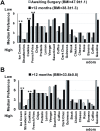Taste and odor preferences following Roux-en-Y surgery in humans
- PMID: 29975712
- PMCID: PMC6033408
- DOI: 10.1371/journal.pone.0199508
Taste and odor preferences following Roux-en-Y surgery in humans
Abstract
It is well established that bariatric surgery, the most effective method to achieve long-term weight loss in obese subjects, reverses enhanced preference and intake of sweet/fatty foods. Although taste and odor preference changes following bariatric surgery have been previously described, their time course and relationship to weight loss remains an issue. The aim of this study was to determine the relationship between taste and odor preference changes and successful weight loss following bariatric surgery. A cross-sectional study was performed on 195 human subjects with body mass index (BMI) above 30 (at least class I obesity), who were scheduled to receive (n = 54) or had previously received (n = 141) Roux-en-Y gastric bypass (RYGB). A Self-Assessment Manikin test was used to measure each participant's affective reaction (ranging from pleasure to displeasure) to a variety of food-related and odor-related pictures. Results confirmed earlier reports about changes in sweet/fatty foods preference after surgery and revealed a shift in preference toward less calorie-dense foods. Relatedly, endorsements of "favorite" foods were mostly sweet/fatty foods in subjects awaiting surgery but were shifted toward more healthy choices, particularly vegetables, in subjects post-RYGB surgery. However, food preference ratings trended toward pre-surgical levels as the time since surgery increased. Answers to open-ended questions about why their diet changed post-surgery revealed that changes in cravings, rather than changes in taste per se, were the major factor. Surprisingly, patients rating a coffee taste as more pleasing after surgery had a lower post-surgical BMI. No associations of odors with change in BMI were apparent. Results showed that following bariatric surgery taste preferences are significantly altered and that these changes correlate with lowered BMI. However, these changes fade as time since surgery lengthens. These results may suggest diagnostic criteria to identify people at risk for less than optimal changes in BMI following bariatric surgery.
Conflict of interest statement
The authors have declared that no competing interests exist.
Figures




Similar articles
-
Does FGF21 Mediate the Potential Decrease in Sweet Food Intake and Preference Following Bariatric Surgery?Nutrients. 2021 Oct 28;13(11):3840. doi: 10.3390/nu13113840. Nutrients. 2021. PMID: 34836096 Free PMC article.
-
Altered neural responsivity to food cues in relation to food preferences, but not appetite-related hormone concentrations after RYGB-surgery.Behav Brain Res. 2018 Nov 1;353:194-202. doi: 10.1016/j.bbr.2018.07.016. Epub 2018 Jul 21. Behav Brain Res. 2018. PMID: 30041007
-
Changes in taste function and ingestive behavior following bariatric surgery.Appetite. 2020 Mar 1;146:104423. doi: 10.1016/j.appet.2019.104423. Epub 2019 Aug 29. Appetite. 2020. PMID: 31473274 Free PMC article. Review.
-
Changes in patients' taste acuity after Roux-en-Y gastric bypass for clinically severe obesity.J Am Diet Assoc. 1995 Jun;95(6):666-70. doi: 10.1016/S0002-8223(95)00182-4. J Am Diet Assoc. 1995. PMID: 7759742 Clinical Trial.
-
Shifts in Food Preferences After Bariatric Surgery: Observational Reports and Proposed Mechanisms.Curr Obes Rep. 2017 Sep;6(3):246-252. doi: 10.1007/s13679-017-0270-y. Curr Obes Rep. 2017. PMID: 28699145 Review.
Cited by
-
The Influence of Roux-en-Y Gastric Bypass and Diet on NaCl and Sucrose Taste Detection Thresholds and Number of Circumvallate and Fungiform Taste Buds in Female Rats.Nutrients. 2022 Feb 19;14(4):877. doi: 10.3390/nu14040877. Nutrients. 2022. PMID: 35215527 Free PMC article.
-
Ghrelin and Glucagon-Like Peptide-1: A Gut-Brain Axis Battle for Food Reward.Nutrients. 2021 Mar 17;13(3):977. doi: 10.3390/nu13030977. Nutrients. 2021. PMID: 33803053 Free PMC article. Review.
-
Neurobiological and Microbiota Alterations After Bariatric Surgery: Implications for Hunger, Appetite, Taste, and Long-Term Metabolic Health.Brain Sci. 2025 Mar 31;15(4):363. doi: 10.3390/brainsci15040363. Brain Sci. 2025. PMID: 40309850 Free PMC article. Review.
-
Behavioral Interventions to Attenuate Driven Overeating and Weight Regain After Bariatric Surgery.Front Endocrinol (Lausanne). 2022 Jul 18;13:934680. doi: 10.3389/fendo.2022.934680. eCollection 2022. Front Endocrinol (Lausanne). 2022. PMID: 35923629 Free PMC article. Review.
-
Anorexia and Fat Aversion Induced by Vertical Sleeve Gastrectomy Is Attenuated in Neurotensin Receptor 1-Deficient Mice.Endocrinology. 2021 Sep 1;162(9):bqab130. doi: 10.1210/endocr/bqab130. Endocrinology. 2021. PMID: 34190328 Free PMC article.
References
-
- Berthoud H, Shin AC, Zheng H. Obesity surgery and gut-brain communication. Physiol Behav. 2011;105: 106–119. doi: 10.1016/j.physbeh.2011.01.023 - DOI - PMC - PubMed
-
- Hajnal A, Kovacs P, Ahmed T, Meirelles K, Lynch CJ, Cooney RN. Gastric bypass surgery alters behavioral and neural taste functions for sweet taste in obese rats. Am J Physiol Gastrointest Liver Physiol. 2010;299: G967–G979. doi: 10.1152/ajpgi.00070.2010 - DOI - PMC - PubMed
-
- Mathes CM, Spector AC. Food selection and taste changes in humans after Roux-en-Y gastric bypass surgery: a direct-measures approach. Physiol Behav. 2012;107: 476–483. doi: 10.1016/j.physbeh.2012.02.013 - DOI - PubMed
-
- Miras AD, le Roux CW. Bariatric surgery and taste: novel mechanisms of weight loss. Curr Opin Gastroenterol. 2010;26: 140–145. doi: 10.1097/MOG.0b013e328333e94a - DOI - PubMed
Publication types
MeSH terms
Grants and funding
LinkOut - more resources
Full Text Sources
Other Literature Sources
Research Materials

